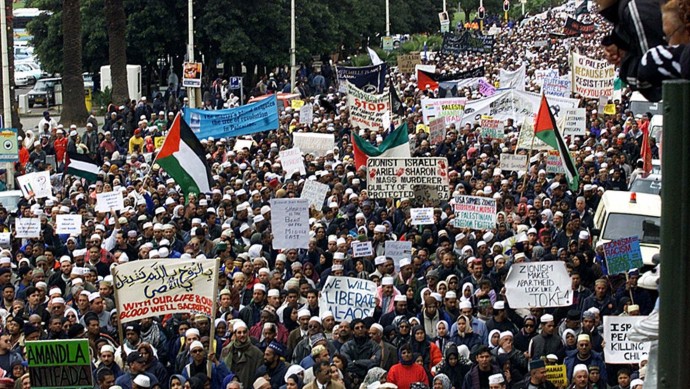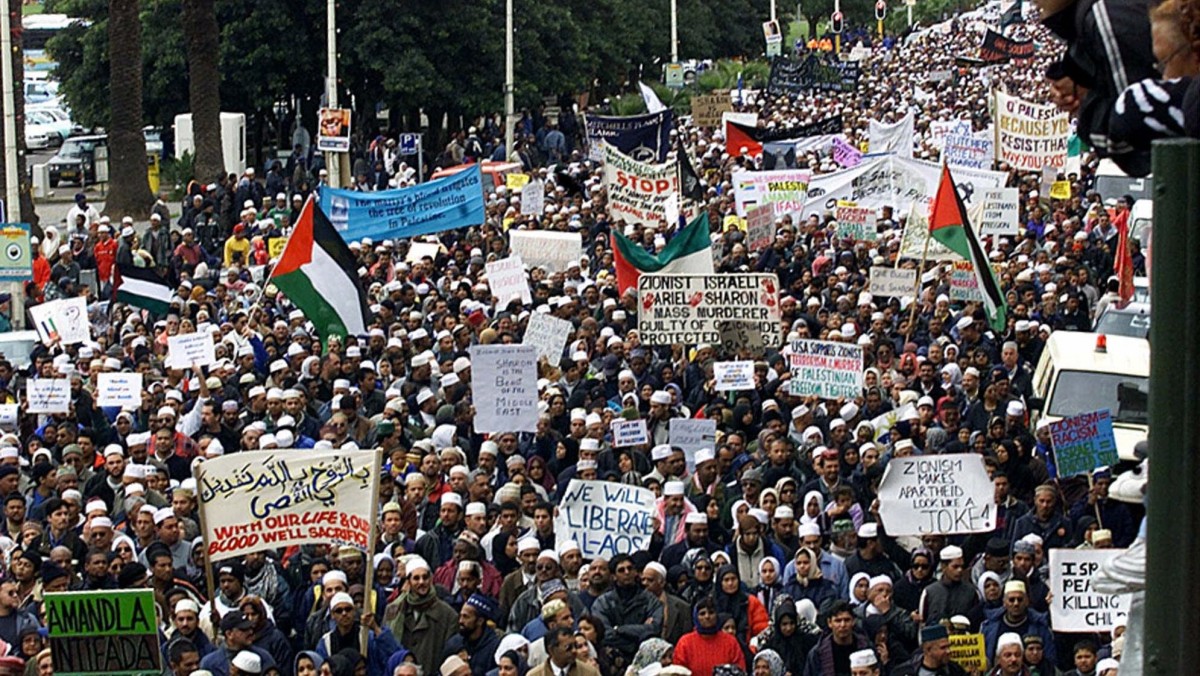
(NAMIBIA) MintPress – Howard Sackstein, founder of the South African Jewish Anti-Apartheid movement, opined that the Boycott, Divestment and Sactions (BDS) movement in South Africa is overpowering pro-Israel lobbies, pointing to a growing rift in Israeli-South African relations following several controversial statements pertaining to Israel made by South African officials earlier this year.
Sackstein, a former employee of AIPAC, the powerful pro-Israel lobby in the U.S., said in an interview with Haaretz that South Africa’s pro-Israel groups are up against “professionals” with roots in the ruling African National Congress (ANC).
According to Sackstein, the ANC’s most recent criticism of Israel is based in a desire to win over a large population of Muslim voters in the Western Cape, the only province not currently controlled by the ANC.
“I think the Muslims in the Cape have got other priorities, but that’s not the point. The point is that the ANC is trying to woo them however it can,” said Sackstein.
“One point I would make finally is that the BDS campaign, spearheaded by Muhammed Desai and Zachi Achmat, is very well run and seems to be well-funded. Maybe local Jewish leaders have relied for too long on their relations with ANC leaders who have in case moved on now – such as former President Mandela – and it’s time for the Jewish leadership to do some hard strategizing. Maybe this should be their new year’s resolution,” Sackstein added.
Sackstein was the founder and vice-chairman of Jews for Social Justice, the Jewish Anti-Apartheid movement in South Africa.
Regardless of the ANC’s presumed election strategies, Sackstein also emphasized that “Israel’s policies and human rights record toward occupied Palestinians are simply unacceptable to any member of the ANC and the South African Left – and maybe to most enlightened people anywhere, including Israel.”
Strained relations continue
South African-Israeli relations have been strained for some years now, but recent decisions to change labels on all products coming from the West Bank and comments made by top officials urging South Africans not to visit Israel have exacerbated issues.
In May, Trade and Industry Minister Rob Davies stated that he intended to issue an official notice “to require traders in South Africa not to incorrectly label products that originate from the Occupied Palestinian Territory (OPT) as products of Israel.”
According to Davies, all products made in the West Bank, particularly in Jewish settlements, may no longer be labelled as a product of Israel.
«This is in line with South Africa’s stance that recognises the 1948 borders delineated by the United Nations and does not recognise occupied territories beyond these borders as being part of the state of Israel,» said government spokesman Jimmy Manyi in a press briefing in August after South Africa’s cabinet approved the notice.
The Israeli government was outraged the by the decision, saying it was full of “blatant discrimination.” Foreign ministry spokesman Yigal Palmor said, “This kind of discrimination has not been imposed – and rightly so – in any other case of national, territorial or ethnic conflict. What is totally unacceptable is the use of tools which, by essence, discriminate and single out, fostering a general boycott.»
Palmor added, «Such exclusion and discrimination bring to mind ideas of racist nature which the government of South Africa, more than any other, should have wholly rejected.»
Davies assured Israeli officials that the decision was not an attempt to boycott Israeli products, but rather a decision to help “South Africans who do not support Israel, but who do support the Palestinians, to identify those products.”
Just last month in another controversial move, Pretoria’s Deputy Minister of International Relations and Cooperation issued a statement urging South African’s to refrain from visiting Israel.
“Israel is an occupier country which is oppressing Palestine, so it is not proper for South Africans to associate with Israel,” Deputy Minister Ebrahim Ismail Ebrahim told the City Press newspaper. “We discourage people from going there except if it has to do with the peace process.”
In line with Davies’ statements, Ebrahim denied his statements were an attempt to boycott Israel. “What we are saying as a government is we discourage South Africans from visiting Israel,” Ebrahim said in a press conference last month in Preotria. “We do not prevent them. We say we discourage them.
“There has been a policy of discouraging, because we believe Israel is an occupying power and is doing all sorts of things in Palestine occupied territory which has been condemned by the entire international community.”
However, Ebrahim added, “There is no policy on the part of the government of boycotting Israel … nor is there a policy of not having diplomatic relations.”
The chairman of the South African Israel Public Affairs Committee, David Hersch, was critical of these recent actions taken toward the state of Israel, calling them “red herrings” and a distraction from ANC policies at home.
“South Africa’s increasing actions against Israel are all red herrings and classic attempts to sidetrack voters, fool the world and a pretence at moral authority riding the rapidly declining momentum that came with her democratic elections in 1994,” said Hersch in a statement.
“South Africa has obviously abandoned it ludicrous claims to becoming involved in peace negotiations between Israel and the Palestinian Arabs. It can no longer pretend to being an ‘honest broker’, which it never was,” added Hersch.
South Africans push for BDS
While the South African government rejects claims that its policies aim at a boycott of Israel, several organizations within the country are pushing for just that. The international campaign of boycotts, divestment and sanctions against Israel is aimed at urging the Israeli government to comply with international law and grant equal rights to Palestinians.
The BDS movement emerged in 2005 after Palestinian civil society issued a call for BDS to end what they view as Israeli apartheid.
The 2005 statement said in part: “We, representatives of Palestinian civil society, call upon international civil society organizations and people of conscience all over the world to impose broad boycotts and implement divestment initiatives against Israel similar to those applied to South Africa in the apartheid era.”
The South African BDS working group recently put up 12 billboards across the country outlining its views on the Israeli occupation of Palestinian lands.
In 2011, the University of Johannesburg (UJ), under pressure from BDS groups, decided to cancel its bilateral agreement with the Ben-Gurion University of the Negev. The previous bilateral agreement dealt with water purification projects in South Africa.
On Aug. 31 this year, the Students’ Representative Council (SRC) of the University of Witswatersrand, Johannesburg, also joined the BDS movement by declaring an academic and cultural boycott of Israel.
The SRC passed a resolution stating the council will “not participate in any form of cultural or academic collaboration or joint projects with Israeli institutions and will not provide support to Israeli cultural or academic institutions.”
The resolution also calls for an investigation into any other associations that Witswatersrand has with Israeli institutions financially or academically. The SRC has committed to “actively campaign and lobby for the University to divest from such relations to further support the boycott of Israel and justice in Palestine.”
The BDS campaign also garners much support within the United States and European countries. In a move similar to that of Davies’ plan to re-label goods coming from the West Bank, the European Union grants a tariff exemption to imports from Israel while denying this exemption to goods coming from the West Bank.
Palestinian support for BDS
Economic boycotts are believed to mainly affect 15,000 Palestinians living in an area of the West Bank known as Area C, which includes settlements and companies operated by Israel. According to 2011 estimates, 76,723 Palestinians work in Israel and the settlements; the estimated unemployment rate in the West Bank was 22.5 percent in 2011.
Reports show that the majority of Palestinians support these boycotts, but Iraqi-born Middle East columnist Linda Menuhin Abdul Aziz remains sceptical.
“A recent survey showing the majority of Palestinians approve of a boycott of West Bank products, I think is misleading,” Aziz told JPost.
“Palestinians are caught in a vicious cycle,” she said. “They cannot afford to lose their jobs and benefits, neither now nor in the future, on the one hand. On the other, they cannot stand up against the boycott lest they be labelled as traitors. The Arab world applies double standards and behaves in a two-faced manner. In public they say exactly the opposite of what they say in private.”
The BDS movement maintains that a clear majority of Palestinian civil society support a boycott on Israel, stating on its website that “The BDS call was endorsed by over 170 Palestinian political parties, organizations, trade unions and movements. The signatories represent the refugees, Palestinians in the OPT, and Palestinian citizens of Israel.”
In response to Deputy Minister Ebrahim’s comments on Israeli tourism, the Palestinian BDS National Committee said in a statement, “As many South African academics, public figures and civil society organisations have themselves noted, Israel implements a regime of apartheid over the Palestinian people that is not only reminiscent of South African apartheid but matches the legal definition of the crime of apartheid as set out in international law.
“Palestinians hope that recent statements by leading South African officials and public figures will usher in more effective pressure on Israel to bring an end to its occupation, colonization and apartheid and to thus enable the Palestinian people to exercise our inalienable right to self determination.”
Supporters of the BDS movement believe that collective sanctions and boycotts against Israel will pressure the government to adhere to international law as was done by international companies against the former apartheid government in South Africa.


